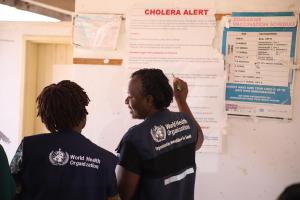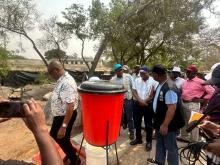Cholera containment effort commendable, but more needs to be done- WHO
By Vivian Mugarisi
After surviving cholera following treatment at Chakohwa Clinic in Buhera, Manicaland Province a few weeks ago, Melissa Chagwina** is taking the hygiene gospel to her village. “I have no plans of becoming a Village Health Worker yet but after my ordeal, maybe someday. For now, I take time to encourage my community on the importance of hand hygiene, use clean water and follow the advice from health workers to stay safe,” she said.
Zimbabwe is currently responding to a cholera outbreak and a total of 5 123 suspected cholera cases, 32 laboratory confirmed deaths, 112 suspected cholera deaths and 933 laboratory confirmed cases had been reported by 17 October 2023. These cases have been reported in 17 traditional cholera hotspot districts of Buhera, Chegutu, Chikomba, Chimanimani, Chipinge, Chitungwiza, Chiredzi, Harare, Gokwe North, Marondera, Mazowe, Shamva, Mutare, Murehwa, Mwenezi, Seke and Wedza and 24 non-hot spot districts. The first case of cholera was recorded on 12 February 2023 in Chegutu.
To step up efforts in the affected districts, the Ministry of Health and Child Care (MoHCC) with support from the World Health Organization carried out a support and supervision visit from 1-7 October 2023. This visit was followed by a high-level delegation led by the Minister of Health and Child Care, Dr Douglas Mombeshora on 13 October 2023. These visits aimed at identifying resource requirements, capacity gaps and identify areas of improvement.
“We have activated the provincial response team and have engaged the Department of Civil Protection and Ministry of Agriculture to expand borehole coverage particularly in these dry areas. We will continue to work with all relevant stakeholders to ensure that those affected receive timely care while education continue in affected and surrounding communities,” said Dr Mombeshora.
The Health Minister was accompanied by the Minister of State for Manicaland Provincial Affairs and Devolution, Advocate Misheck Mugadza, Permanent Secretary for Health Dr Aspect Maunganidze, the World Health Organization (WHO) Country Representative Professor Jean-Marie Dangou, UNICEF Representative Dr Tajudeen Oyewale, representatives from Medicines San Frontiers (MSF) and Red Cross. The delegation visited Murambinda Hospital, Mudanda Rural Health Centre and Betera Clinic where most of the cases are concentrated.
Village Health Workers (VHWs) are working tirelessly to provide relevant health information in affected and surrounding communities for improved hygiene, with people like Chagwina complementing these efforts. Information, Education and Communication (IEC) materials are being distributed with health promotion officers on the ground to continue with community sensitization. VHWs have also been equipped with hydration salts and necessary personal protective equipment (PPE) to help patients whilst waiting for transportation to facilities.
“Health education has been our top priority and good thing is most of them are now heading our call,” said VHW Taruvinga Zibwowa responsible for Tabarira, Mubvirwi, Sunduza, Zingwini Villages and reporting at Mudanda Clinic.
At facility level, counselling is being provided to all patients, suspected, or confirmed, while guidelines are being observed to manage patients. Notifications are being done within the recommended timeframes. Non-Food Items which include tapped buckets have been distributed in affected communities to ensure that they have dedicated washing points. Water quality monitoring is being done regularly while school health programmes are ongoing to promote hygiene in schools.
While a lot has been done to respond to cholera, challenges persist. Some of those affected are linking the illness and deaths in the households to witchcraft despite health education efforts. Unmonitored funerals have been super spreaders as most are not giving professionals an opportunity to monitor and guide funerals proceedings.
With Zimbabwe currently experiencing its dry season, lack of access to adequate safe drinking water and poor sanitation in the affected districts is one of the major drivers of the cholera outbreak.
“We applaud the work being done at the moment and it’s encouraging that teams are on the ground to respond to the outbreak,” noted Professor Dangou.“We continue to encourage Government of Zimbabwe to address the existing challenges in these affected communities and WHO will continue to support all response efforts,” he added.
In May, WHO handed over an assortment of cholera supplies to the Government of Zimbabwe to compliment cholera response efforts. As the outbreak continues WHO is supporting technically through trainings and supervision visits, guidelines revision to suit context and financially through a grant from United Nations Central Emergency Response Fund (UNCERF) and the Contingency Fund for Emergencies (CFE).
**Names changed to protect identity of the individual

